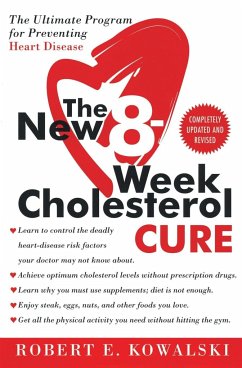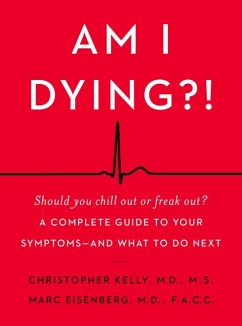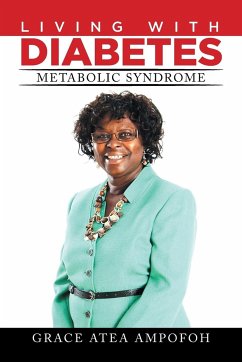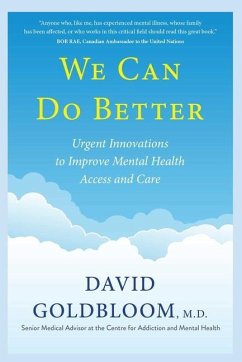Nicht lieferbar

Handbook of Rehabilitation Psychology
Versandkostenfrei!
Nicht lieferbar




The handbook has been significantly updated to reflect new developments in rehabilitation. Chapters address core and emerging topics, including competency-based practice, traumatic brain injury, public health, artificial intelligence, and virtual reality.
Lisa A. Brenner, PhD, ABPP, is a board-certified rehabilitation psychologist a professor of physical medicine and rehabilation (PM amp R), psychiatry, and neurology, the University of Colorado, Anschutz School of Medicine and the director of the Veterans Administration Rocky Mountain Mental Illness Research, Education, and Clinical Center. She is also the research director for the Department of PM amp R, as well as a past president and fellow of APA Division 22 (Rehabilitation Psychology). Dr. Brenner is an associate editor for the Journal of Head Trauma Rehabilitation. Her primary areas of research interest are traumatic brain injury, comorbid psychiatric disorders, and negative psychiatric outcomes including suicide. Visit her website (http://www.mirecc.va.gov/visn 9) and follow on twitter LisaABrenner. Stephanie A. Reid-Arndt, PhD, ABPP, is associate dean for academic affairs in the School of Health Professions at the University of Missouri, Columbia. She is a fellow of the American Psychological Association and is board-certified in rehabilitation psychology. She is widely published, and she currently serves on the editorial boards of the Journal of Head Trauma Rehabilitation and Rehabilitation Psychology. Dr. Reid-Arndt's research focuses on understanding how psychosocial factors and neuropsychological functioning influence health outcomes and quality of life for individuals with chronic medical conditions, particularly traumatic brain injury and breast cancer. She lives in Columbia, Missouri. For more information, visit her website (https://healthprofessions.missouri.edu/personnel/ stephanie-reid-arndt/). Timothy R. Elliott, PhD, ABPP, is a university distinguished professor in the Department of Educational Psychology and executive director of the Telehealth Counseling Clinic at Texas A amp M University. He is a past president of APA Division 22 (Rehabilitation Psychology), current editor of the Journal of Clinical Psychology, and a past editor of Rehabilitation Psychology. His research examining adjustment processes among people living with chronic health conditions contributed to innovations in telepsychology services for underserved communities. He is a recipient of several awards and honors, including from APA Division 22. Dr. Elliott lives in Fischer, Texas. For more information, visit his website (http://telliott.education.tamu.edu/). Robert G. Frank, PhD, is director of the Center for Innovation in Health and Education at the University of New Mexico. He formerly served as president at the University of New Mexico, as provost at Kent State University, and as dean of the College of Public Health and Health Professions at the University of Florida. Throughout his career, Dr. Frank has been highly involved with health policy at both federal and state levels, working with numerous initiatives and policymakers. Dr. Frank is a past president of APA Division 22 (Rehabilitation Psychology). He lives in Albuquerque, New Mexico. Visit his website (http://nmcup.us/council-members/robert-frank.html) and follow RG_Frank25. Bruce Caplan, PhD, ABPP (CN, RP), has received two Distinguished Service Awards and the Lifetime Practice Excellence Award from APA Division 22 (Rehabilitation Psychology). He previously served as president of Division 22 and as editor of Rehabilitation Psychology, the Division's journal. Dr. Caplan is senior editor of the Journal of Head Trauma Rehabilitation, a member of the editorial board of Topics in Stroke Rehabilitation, and a founding member of the American Board of Rehabilitation Psychology. He coedited two editions of the Encyclopedia of Clinical Neuropsychology and was sole editor of the Rehabilitation Psychology Desk Reference. Currently in independent practice in Wynnewood, Pennsylvania, he was formerly chief psychologist in the Department of Rehabilitation Medicine at Jefferson Medical College.
Produktdetails
- Verlag: American Psychological Association (APA)
- 3rd edition
- Seitenzahl: 544
- Erscheinungstermin: 28. Mai 2019
- Englisch
- Abmessung: 282mm x 221mm x 33mm
- Gewicht: 1656g
- ISBN-13: 9781433829857
- ISBN-10: 1433829851
- Artikelnr.: 54801432
Herstellerkennzeichnung
Libri GmbH
Europaallee 1
36244 Bad Hersfeld
gpsr@libri.de
Für dieses Produkt wurde noch keine Bewertung abgegeben. Wir würden uns sehr freuen, wenn du die erste Bewertung schreibst!
Eine Bewertung schreiben
Eine Bewertung schreiben
Andere Kunden interessierten sich für











